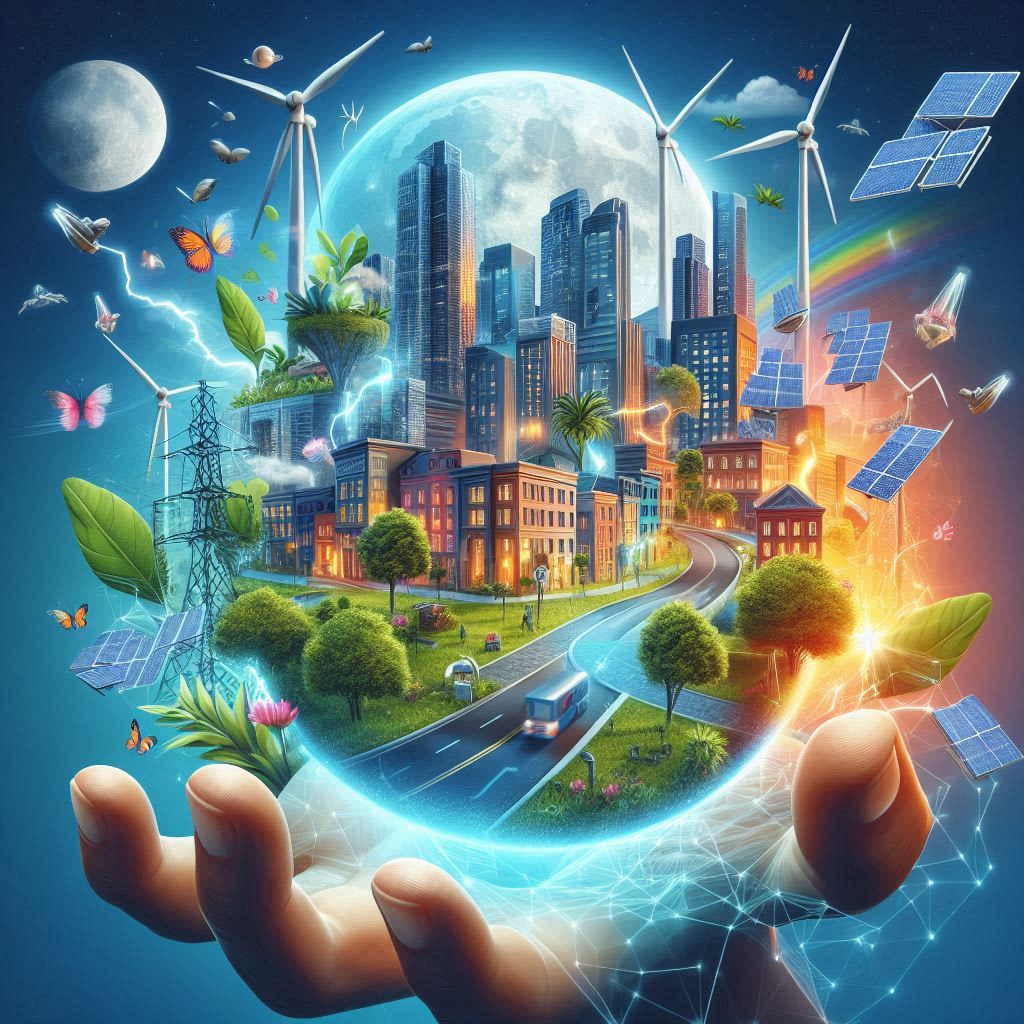Powering Our Future: A Shift Towards Clean Energy Sources
Beyond Fossil Fuels: A Realistic Look at Renewable Energy Solutions

Powering Our Future: A Shift Towards Clean Energy Sources
The world we live in is fueled by an insatiable hunger for energy. From the moment we wake up to the lights illuminating our homes to the information constantly flowing through our devices, a steady supply of power is the lifeblood of modern civilization. Currently, over 85% of this energy comes from the burning of fossil fuels – oil, coal, and natural gas.
This dependence, however, casts a long shadow. Scientists have reached a strong consensus that the unchecked burning of fossil fuels is a primary driver of climate change. This phenomenon, characterized by rising global temperatures and a disruption of weather patterns, threatens our planet with a multitude of consequences. Rising sea levels could inundate coastal cities, the spread of infectious diseases could become more prevalent, and competition for dwindling resources like water and food could escalate into conflict.
The need for action is undeniable. While adopting a more sustainable lifestyle and reducing energy consumption are crucial first steps, they are not enough. We need a two-pronged approach: utilize existing fossil fuels more efficiently and explore alternative, climate-neutral energy sources.
This article delves into the exciting world of renewable energy. Here, we will explore a range of solutions, from established technologies like solar power to cutting-edge possibilities like harnessing the power of waves to create electricity.
From Sunshine to Electricity: The Power of Renewables
Solar energy has emerged as a leading contender in the renewable energy race. Photovoltaic (PV) cells, the technology behind solar panels, convert sunlight directly into electricity. This technology has seen a dramatic decrease in cost in recent years, making it a homeowner's dream and a driver for large-scale solar farms. For example, India recently inaugurated the world's largest solar power plant in Rewa, Madhya Pradesh, with a capacity of 1 GW (gigawatt). This shift towards solar is not just driven by cost reductions but also by government policies like net metering, which allows homeowners to sell excess solar energy back to the grid.
Beyond solar, wind energy is another established player. Wind turbines harness the power of moving air to generate electricity. Wind farms are becoming a familiar sight on land and even offshore, where powerful ocean winds can be harnessed. The United States boasts the second-highest wind energy capacity globally, with Texas leading the way in wind power generation.
Hydropower, using the force of moving water to generate electricity, is a mature technology with a long history. Dams across rivers create reservoirs that store water, which is then released through turbines to spin generators. While a valuable source of clean energy, hydropower projects can have significant environmental impacts on ecosystems and fish migration. Finding a balance between energy generation and environmental protection is crucial for responsible hydropower development.
Geothermal energy taps into the Earth's internal heat. Hot water and steam trapped deep underground can be used to generate electricity through geothermal power plants. This source offers the advantage of being baseload – meaning it can provide consistent power generation regardless of weather conditions. Iceland, for instance, harnesses its volcanic activity to generate over 25% of its electricity from geothermal sources.
Emerging Frontiers: Exploring New Possibilities
The world of renewable energy extends beyond these established technologies. Researchers are constantly exploring new avenues to harness clean energy from diverse sources.
One promising area is bioenergy, which utilizes organic materials like plant matter or waste products to produce fuels. Biofuels can power vehicles and even be converted into electricity. While concerns exist regarding competition with food production and potential environmental impacts, advancements in biofuel technology offer a glimpse into a more sustainable future. For example, research on algae biofuels is gaining traction. Algae can be grown efficiently in controlled environments and converted into biodiesel, offering a promising alternative to traditional fossil fuels.
Another intriguing possibility is ocean energy. The power of waves, tides, and currents can all be harnessed to generate electricity. While still in its early stages of development, ocean energy holds immense potential, especially in coastal regions. Scotland, a country with a long coastline, is a leader in ocean energy development, with projects testing wave and tidal energy generation.
Bridging the Gap: Storage and Efficiency Solutions
A critical challenge in integrating renewable energy sources is their intermittent nature. Solar and wind power generation fluctuate depending on weather conditions. Energy storage solutions are crucial to bridge this gap and ensure a reliable and consistent electricity supply.
Battery storage technology is experiencing rapid development, with companies like Tesla leading the charge with their Powerwall home battery systems. These systems allow homeowners with solar panels to store excess energy generated during the day and use it at night, increasing their reliance on renewable energy.
On a larger scale, pumped hydro storage offers a proven solution. This method uses surplus electricity to pump water uphill to a reservoir. When electricity demand is high, the water is released back down through turbines, generating electricity.
Energy efficiency also plays a vital role in the clean energy equation. By reducing our overall energy consumption, we lessen the demand on any energy source, be it renewable or fossil fuel-based. This can be achieved through a multi-pronged approach. Implementing smart grid technologies allows for more efficient distribution of electricity, reducing energy losses during transmission. Additionally, encouraging the use of energy-efficient appliances and promoting sustainable building practices can significantly reduce energy consumption in homes and businesses. For instance, the European Union's (EU) energy efficiency regulations have been instrumental in driving down energy consumption across member states.
By combining a focus on renewable energy sources, energy storage solutions, and energy efficiency, we can create a sustainable and secure energy future for generations to come.
The Road Ahead: Challenges and Opportunities
Despite the vast potential of renewable energy sources, significant challenges remain. Integrating these diverse sources into a reliable and efficient grid presents a complex engineering task. Additionally, the upfront costs of some renewable energy technologies can be higher than those of traditional fossil fuel plants.
However, these challenges are not insurmountable. As research and development continue, the costs of renewable energy are steadily decreasing. Additionally, government policies and incentives can play a crucial role in encouraging investment and adoption. For example, tax credits for installing solar panels or feed-in tariffs that compensate homeowners for excess solar energy they sell back to the grid can significantly accelerate the transition towards clean energy.
Conclusion: A Brighter Future Powered by Renewables
The transition towards a clean energy future is no small feat. It requires a collective effort from governments, businesses, and individuals. However, the potential benefits are undeniable. By embracing renewable energy sources, we can safeguard our planet for generations to come, ensuring a sustainable and secure energy future for all. Additionally, the clean energy sector offers immense economic opportunities, with job creation in areas like solar panel manufacturing, wind turbine installation, and biofuel production.
The future of energy is bright. With continued investment, innovation, and a commitment to sustainability, we can power our world with clean, renewable sources, leaving a healthier planet for future generations.
About the Creator
suren arju
Hi there! I'm Suren, your startup guide. Entrepreneur, writer, dreamer - I share insights, tips & stories to fuel your startup journey. Ready to explore, learn & win together? Join me & let's redefine how we launch, learn & leap!





Comments
There are no comments for this story
Be the first to respond and start the conversation.